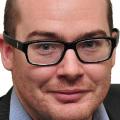THE Bishop of Worcester has been backed by a senior bishop for wading into the political debate about the Prime Minister’s chief adviser Dominic Cummings travelling to County Durham at the height of the pandemic.
Bishop John Inge took the unusual step of condemning Dominic Cummings for not making the same sacrifices as other families during the coronavirus pandemic.
He spoke out via social media as the debate raged when it was revealed Mr Cummings had travelled 260 miles with his family, in March, to be near relatives at a family farm in the North East.
Mr Cummings defended the journey, saying the rules allowed parents to travel for childcare in exceptional circumstances. It was further revealed that he had driven to a nearby town, Barnard Castle, something Mr Cummings said was necessary to 'test his eyesight' before he returned to London.
Despite widespread anger that the adviser had not abided by the 'spirit of the lockdown' Prime Minister Boris Johnson backed him.
Bishop John wrote on Twitter: "The PM tells us that Cummings ‘followed the instincts of every father’ and that he ‘does not mark him down for that’. The point is that thousands and thousands of parents, including me, have not been able to follow their instincts because they felt they had to obey the rules. The PM’s risible defence of Cummings is an insult to all those who have made such sacrifices to ensure the safety of others."
Discussing the events at a meeting of the General Synod, which gathered virtually due to the Covid-19 pandemic, the Rt Revd Dr David Walker, Bishop of Manchester said bishops who spoke out had been motivated by the need to “uphold the principle of truth”.
Dr Walker said: “I think in this particular instance, bishops’ tweets were a contribution to discussion that was pretty much of national importance. I think it was headline news for several days. Those tweets were, as I understand it, motivated particularly by a deep conviction of the need to uphold the principle of truth in public life. I think we would do well to remember that when our esteemed colleague Desmond Tutu in South Africa headed up a commission following the apartheid, it was called ‘truth and reconciliation.’ And truth and reconciliation have to go together. Without truth, it’s very hard to achieve reconciliation.”






Comments: Our rules
We want our comments to be a lively and valuable part of our community - a place where readers can debate and engage with the most important local issues. The ability to comment on our stories is a privilege, not a right, however, and that privilege may be withdrawn if it is abused or misused.
Please report any comments that break our rules.
Read the rules hereLast Updated:
Report this comment Cancel